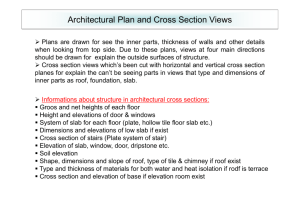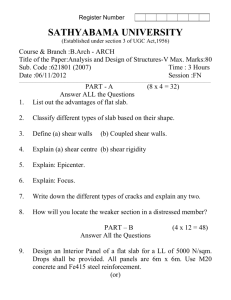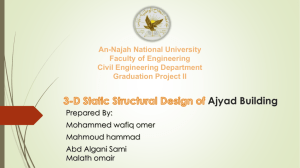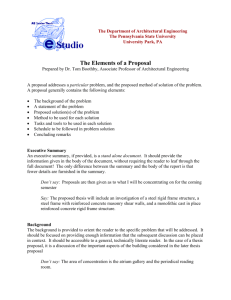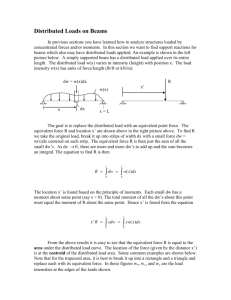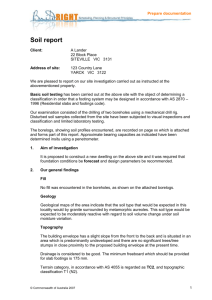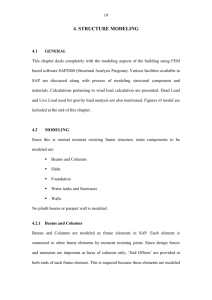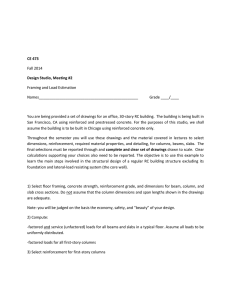An-Najah National University
advertisement
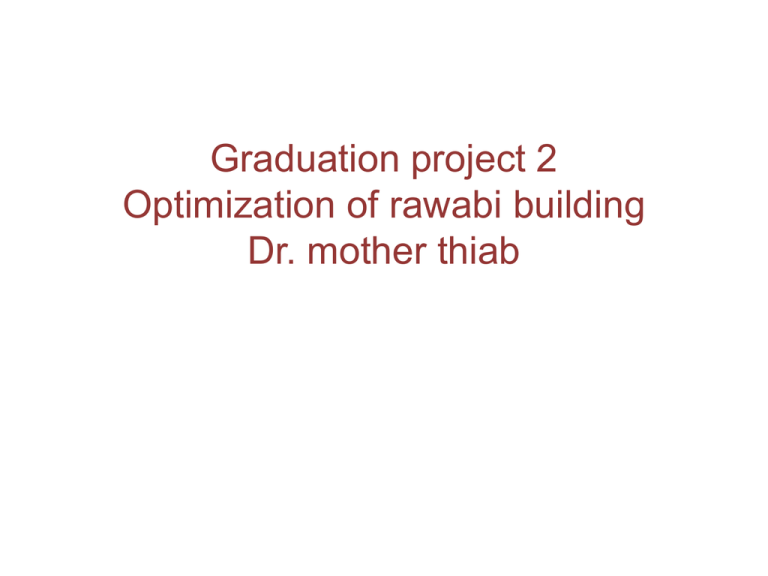
Graduation project 2 Optimization of rawabi building Dr. mother thiab isra Azzam asia hamza rawan barham . Chapter One introduction • This project is the final graduation project submitted to the Civil Engineering Department in partial fulfillment of the requirements for the degree of B.Sc. in Civil engineering at ALNajah National University. • The project is rawabi residential building in Ramallah with an overall area = distributed over existing 7 stories of which 1 is basement. Objectives: • In this project we work to apply all concepts of structural Engineering that we are learned over five years. We have studied many courses in the program of the Civil Engineering Department at Al-Najah University. Different types of analysis and design are done in this project in order to choose the most safe and economical type Importance: • The importance of rawabi project: - rawabi is one of the important buildings in the nation in all parts of Palestine. Rawabi is a new city for Palestinian families it will provide opportunities for affordable home owner ship, employment, education and leisure and an attractive environment in which to live ,work and visit .best of all rawabi is the best quality of life option well within the financial reach of many young Palestinian families . The building Structural systems • Form – active structures (transfer of loads in single stress, compression or Tension) • Vector – active structures (transfer of loads in one dimension tension and compression) • Section – active structures • Surface – active structures (transfer of loads through surfaces) • Height – active structures (high – rise structures Type of structure Chapter Two • Site , material , loads And program used location • Description of rawabi project:- rawabi is one of the biggest residential building in Palestine , which is constructing in Ramallah city , it has been started in 2007. Rawbi building consists of seven stories of total area ,the total height of the building (19..8m). Materials of construction • Structural materials used locally can be classified into two categories; steel and reinforced concrete. Each type is suitable for certain types of buildings. • In this project reinforced concrete is used, this choice is built on several reasons; first of all that concrete has less cost than steel locally , second is the availability of this material in Palestine so there is no need to import it from other countries like steel. Concrete:• • • • Concrete normal weight γc . Concrete compressive strength fcʹ Concrete modulus of elasticity EC The rest of the materials are assumed to have the following properties: – – – – – • Density of tiles is . Density of stone is . Density of un-reinforced concrete is . Density of sand is . Density of block is . Steel Reinforcement • The deformed bars are the type of the bars that were used in this project. Local markets of building materials provide deformed bars with a 12 m length. Loads: • • • • Gravity Loads Dead Load Live Loads Environmental Loads Load Combination • U= 1.2*D.l+1.6*LL • U=1.2D.l+1.6L.L+.5S • U= .9D+1.6W+1.6H Chapter Three • Slabs Introduction : • Structural concrete slabs are constructed to provide flat surfaces, usually horizontal, in building floors, roofs, bridges, and other types of structures. The slab may be supported by walls, by reinforced concrete beams usually cast monolithically with the slab, by structural steel beams, by columns, or by the ground. The depth of the slab is usually very small compared to its Span. • The slabs of this project are divided into panels with one way structural systems and maximum values of moment and shear for each panel is taken as critical value and used in the design of panels. slab design check: • Slab weight =( .12*.2 + .08*.67)*25+(.55*.2*12)=3.26 kn/m • Slab weight = 3.26/.67= 4.85kn/m2 • Wu = 1.2*4.85 +4*1.6= 12.22 kn/m2 • After that we draw the bending moment diagram Mu= 5.28/(5.28+3.39)*(19-7.84)= 6.69kn.m • • • • • • • As = 138mm2 top steel =2Φ8 Mu bottom = 19kn.m From interpolation As = 392mm2 (3Φ12) (Which is acceptable as ETABS give us ) Chapter four • Beams Introduction:• A beam is a structural element that carries load primarily in bending (flexure). Beams generally carry vertical gravitational forces but can also be used to carry horizontal loads (i.e. loads due to an earthquake or wind). The loads carried by a beam are transferred to columns, walls, or girders, which then transfer the force to adjacent structural compression members. In Light frame construction the joists rest on the beam. Beams are classified into two types Dropped beams 2Beam design check • • • • • • • • • • • • The beam name is L 1-B2 L.L =4KN/M2 D.L =load from slab+ load from beam its own weight Weight of the slab = 3.26 kn /m Weight of the beam = .28*.4*25 =2.8kn/m D.L= 3.26*3.17+2.8*3.08=18.9kn Wu= 1.6*4+1.2*18.9= 660 kn After drawing mu and computing then we compute AS=ρbd Mu= wL2/8= 29*3.08^2/8= 34.3kn.m As = ρbd = .0035*400*260= 364mm^2 3Φ14 ok for beam and all beams done as that Chapter 5 • Columns Introducttion • Columns are vertical compression members of a structural frame intended to support the load carrying beams. They transfer loads from the upper floors to the lower levels and then to the soil through foundations. Failure of one column in a critical location can cause the progressive collapse of the adjoining floors and the ultimate total collapse of the entire structure. • In general, the column is a member subjected to an axial compressive force, in addition to bending moments in some cases. • Columns can be classified on the basis of the form arrangement of reinforcement as; rectangular or square, circular, and composite columns, the position of load on the cross section, and the length of the column relation to its lateral dimensions. • Although tied columns are the most commonly used because of lower construction cost, spirally bound columns are also used where more ductility is needed as in earth- quake zones. Type of coloumn Chapter 6 • Foundation Introduction • Reinforced concrete footings are structural members used to support columns and walls to distribute their loads to the soil .The design is based on the assumption that the footing is rigid so that the variation of the soil pressure under the footing is linear. • Foundation used to transmit high concentrated columns , wall reactions and lateral loads from retaining walls to ground without cause unsafe differential settlement of the structural system or soil failure . • • Uniform soil pressure is achieved when the column load coincides with the centroid of the footing. Although this assumption is acceptable for rigid footing, such an assumption becomes less accurate as the footing becomes relatively more flexible Types of footings Depending on depth • Sallow footings : its depth is usually D ≤ B, it contains isolated, combined , strip and raft footing . • Deep footings : with D> (4 to 5) B pile footing is one type of deep footing . • Shallow Foundation Types • • • • • • • • • • • • • Continuous footings . Cantilever or strap footings -Combined -Isolated Wall Footings Raft) footings (Thickened slabs) Mat ( 2Deep foundations 1. Pile foundations 2. Piers 4. Compensated foundations 3. Caissons manual design for some type of footing in the project • • • • • • • • • • • Fc=32Mpa Fy=420Mpa We have ribbed slab with thickness 28 cm Slab own weight = 4.85kn/m^2 was calculated previous Live load = 4kn/m2 The tributary area that the column cover =15.5m2 So that : DL= 15.5*4.85=75KN LL=15.5*4=62KN This calculation for one floor so for 7 floors : P=7*(75+62)=959kn • • • • • • To determine the area of footing we need: qall for the soil=400knlm2 σ=p/A=400 A=959/400=2.4 Take L=1.5 B= 1.5 Now we want to determine the thickness of the footing • Pu=1.6*75+1.2*62=194.4 • D=10√pu=10(194.4)^.5=140 • • • • • Assume d=320mm , h=400mm Φvc=.75*(1/6)√32(320)*1.75*10^-3= 396kn Vu=.625*400*1.5=375 kn<396 ok For punching also the design is ok Vu=pu*bo*σ=194.4*540*400=42kn<Φvc ok Reinforcement : • • • • • • • Longitudinal reinforcement: Mu=σul^2/2=400*.625^2/2=78.125kn.m/m = 2.079*10^-3 As =ρbd=666 mm^2/m(4Φ14) Transverse direction : l= .625 M= 400*.625^2/2 =55.3kn.m From interpolation we found AS =470mm^2/m(3Φ14) wall footing • • • • • • • • • • • • • • • • • • • • • • • • • • • Shear wall need wall footing design L=1m L.L= 4kn/m2 D.L= weight of the shear wall + weight of the slab Weight of the shear wall= 25*1*.2*3= 15kn /m Weight of the slab= 4.85kn/m D.L=15+4.85= 20 kn/m L.L=4* tributary area= 4*(3.5)=14kn/m D.L=7*20=140kn/m L.L=7*14=98kn/m Determining B (width of footing) σ = L.L+D.L/B+1=400kn/m2 =238…………………B=238/400=.6=1m σu= 1.2*140+98*1.6/1*1=325kn/m2 determining the thickness by considering the wide beam shear only : Vu= σu(.4-d/1000) Φvc= .75(1/6)√fc*1000*d/1000=vu From these to equations determine d=150mm H=d+80(cover)=150+80=230mm≈250mm The reinforcement : M = σ u* L^2/2 = 325*.4^2/2=26kn.m (b=1000 d=150) Ρ=3.43*10^-3 As = Ρbd=515mm^2/m Asmin= .0018bH=.0018*1000*250=450 <As use As 5Φ12/m Longitudinal reinforcement : Use Asmin=450mm2 Chapter 7 • Modeling introduction • The main aim of our project is to choose the most economical design that we can get after taking safety factors in our consideration . so four modals has been done so that to choose the most appropriate one ,and here there are The first modal is Ribbed slab Tsection The second model is ribbed slab &slab rectangular The third modal is solid slab The final modal is solid slab set modifiers The end • Happy to listen to any questions
